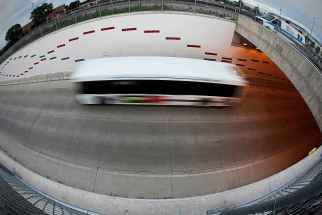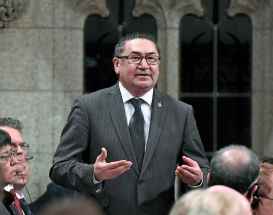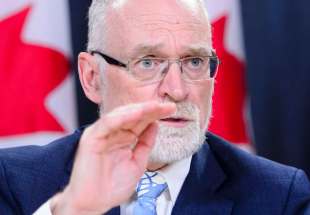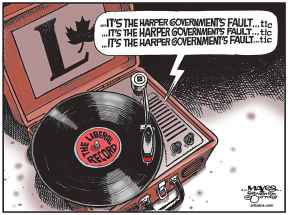Winnipeg Transit will get $530 million over the next decade Billion-dollar infrastructure agreement between provincial and federal governments also means cash for rec centres, roads and and northern communities
Read this article for free:
or
Already have an account? Log in here »
To continue reading, please subscribe:
Monthly Digital Subscription
$0 for the first 4 weeks*
- Enjoy unlimited reading on winnipegfreepress.com
- Read the E-Edition, our digital replica newspaper
- Access News Break, our award-winning app
- Play interactive puzzles
*No charge for 4 weeks then price increases to the regular rate of $19.00 plus GST every four weeks. Offer available to new and qualified returning subscribers only. Cancel any time.
Monthly Digital Subscription
$4.75/week*
- Enjoy unlimited reading on winnipegfreepress.com
- Read the E-Edition, our digital replica newspaper
- Access News Break, our award-winning app
- Play interactive puzzles
*Billed as $19 plus GST every four weeks. Cancel any time.
To continue reading, please subscribe:
Add Free Press access to your Brandon Sun subscription for only an additional
$1 for the first 4 weeks*
*Your next subscription payment will increase by $1.00 and you will be charged $16.99 plus GST for four weeks. After four weeks, your payment will increase to $23.99 plus GST every four weeks.
Read unlimited articles for free today:
or
Already have an account? Log in here »
Hey there, time traveller!
This article was published 04/06/2018 (2753 days ago), so information in it may no longer be current.
OTTAWA — Winnipeg Transit is the big winner following a massive infrastructure agreement the federal government inked with the province on Monday.
The decade-long deal will see the federal government spend $1.17 billion for infrastructure projects between 2018 and 2028 through a bilateral, cost-sharing agreement that will span everything from green initiatives to recreational centres to all-weather roads and public transportation. Nearly half of the total — $530 million —will go to public transit in Winnipeg.
“It’s the largest federal-provincial infrastructure funding agreement in Manitoba’s history,” said provincial Municipal Relations Minister Jeff Wharton, who was flanked by federal Infrastructure Minister Amarjeet Sohi at a news conference Monday morning at The Forks.
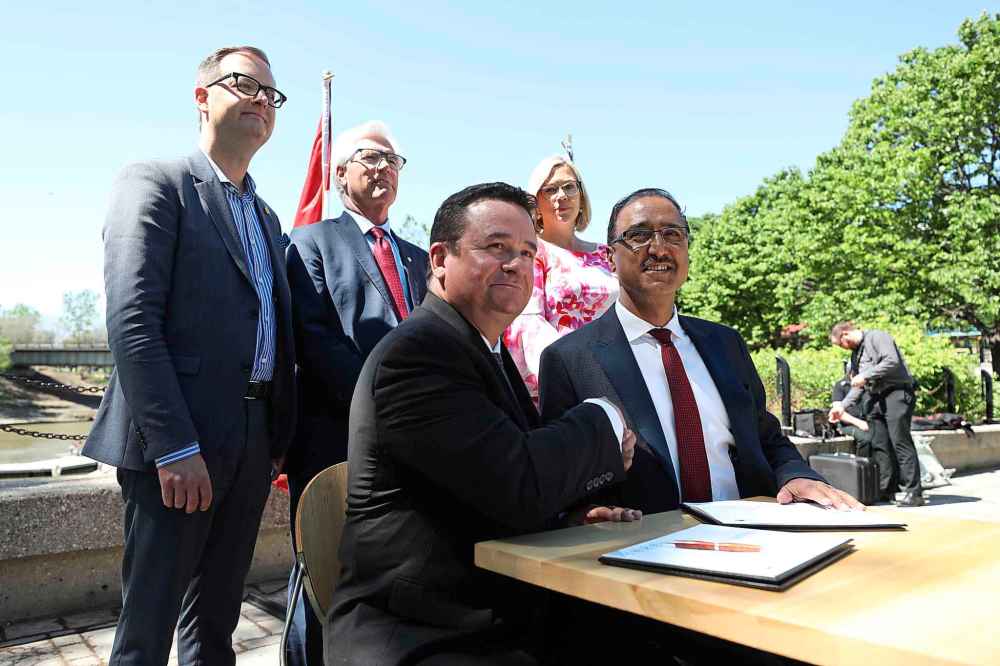
“This is about building strong communities, at the end of the day,” Sohi said in an interview.
Sohi said $530 million of the federal public-transit money will go directly to Winnipeg. Once cost-sharing with the province and city is factored in, it will mean as much as $1.3 billion for Winnipeg Transit “to build new urban transit networks and service extensions,” according to a news release.
Joseph Kornelsen, the chair of Functional Transit Winnipeg, said that “remarkable amount” could mean more bus lanes and larger buses, but “solid, convenient and frequent” transit will only come if it’s planned well, and if there’s also more funding for actual bus service.
“If the city is not able to increase its own investment in service, and is instead threatening cuts like it did last year, then all this infrastructure investment will be for naught,” he said.
Manitoba’s infrastructure funding will be split between four areas:

Public transit
$546 million

Green infrastructure
$452 million

Community, culture and recreation infrastructure
$61 million

Rural and northern communities infrastructure
$113 million
If Winnipeg doesn’t use all the transit cash, the leftover funds will go to green-infrastructure programs, but only with consent of the city and province, Sohi said.
Sources familiar with the negotiations say the Pallister government had sought more funding for rural public-transit needs than the three per cent allocated outside Winnipeg.
Manitoba Chambers of Commerce CEO Chuck Davidson said the bilateral agreement give the province a chance to harmonize its Climate and Green Plan with local needs. “They tend to start with the grassroots,” Davidson said of federal cost-sharing.
Although Monday news release mentions green initiatives and only refers to roads to remote communities, Davidson said businesses have long called for “key corridors” to be shored up for trucking goods.
That means upkeep for Highway 75 to the U.S. border, and paving the gravel sections of Highway 283 from The Pas into Saskatchewan. The latter would be especially important for shoring up the viability of Churchill’s port and railway, he said.
“We think a key part of being able to stimulate — specifically in the rural and northern economy (is the) identification of infrastructure priorities,” Davidson said.
The federal government has reached bilateral agreements with each province and territory, and will invest more than $33 billion in infrastructural project funding nationwide. Manitoba has clinched slightly more than its proportionate share of the funding.
“We have tried to figure out (how) to be fair to a province like Manitoba, because of the smaller population compared to other large provinces,” Sohi said.
The province did not say Monday how much money it expects to contribute under this bilateral agreement; Wharton said the province will work “collaboratively” with the Assembly of Manitoba Municipalities to pick projects. The cost-sharing formula varies based on the type of project.
Ottawa’s share of projects:
– 40 per cent for public transit
– 50 per cent for northern/rural projects
– 60 per cent for communities with fewer than 5,000 residents
– 75 per cent in Indigenous communities
The Liberals’ last major infrastructure cost-sharing proposal hit hurdles in Manitoba. Last fall, Winnipeg’s city council shelved eight roadway projects, including a pedestrian-bike bridge over Pembina Highway, after the cash-strapped province restricted its spending.
Sohi said Winnipeg’s accelerated regional road application is still under review through the existing Building Canada Fund.
In January, Natural Resources Minister Jim Carr started semi-regular meetings with Mayor Brian Bowman, Deputy Premier Heather Stefanson and himself, in the hopes of diffusing conflict and getting infrastructure dollars on track.
Carr suggested Monday he believes the three levels of government are closer to working in lock-step, with regular talks ongoing but no formal three-way meetings planned until after the October mayoral race.
“We’re working well together; our priorities are aligned,” he said.
Monday’s bilateral announcement is all money that was newly allocated in Budget 2017; Ottawa did not roll in the existing GST and gas-tax rebates that are used to fund municipalities’ infrastructure needs.
The federal spending is part of the Liberals’ choice to run huge deficits on housing, childcare and infrastructure, in the hopes of getting more people working.
dylan.robertson@freepress.mb.ca
ben.waldman@freepress.mb.ca

Ben Waldman covers a little bit of everything for the Free Press.
Our newsroom depends on a growing audience of readers to power our journalism. If you are not a paid reader, please consider becoming a subscriber.
Our newsroom depends on its audience of readers to power our journalism. Thank you for your support.



